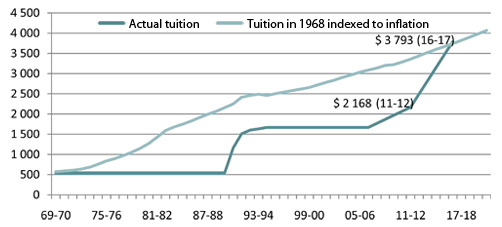In its budget this past spring, Jean Charest’s government announced its plans to increase tuition in Quebec by $325 per year for five years, beginning next fall. By 2016-17, the basic undergraduate tuition in Quebec will reach $3,792 for a typical, 30-credit year. While the tuition increase will keep Quebec students’ fees well below the average elsewhere in Canada, the increases still clock in at 75% over five years. Clearly there is potential for a significant impact on enrolment.

So it was with great pleasure that I read the recent report of the province’s committee on access (en français), the Comité sur l’accessibilité financière aux études. The report describes the government’s plans to expand the already robust student aid system to ensure the most vulnerable students remain immune from a price shock.
Here’s the bluffer’s guide to Quebec’s tuition increase:
1. Tuition will increase by 75% by 2016-17…
2. Except for low-income students who receive financial aid, since the province will cover the entirety of their expanded tuition bill in the form of non-repayable bursaries; some lower-middle-income students will also benefit from expanded access to the bursary program…
3. Additionally, the province is planning to expand access to its loans and bursaries program by reducing the amount of income it expects a parent or spouse to contribute to a student’s education.
4. All told, the province is ramping up student aid funding by $118.4 million, an amount equivalent to 35% of the new tuition revenue
The province’s student groups are bellyaching about the tuition increase and the fact that, from a certain perspective, the province is robbing Peter to pay Paul. There is some merit to this view – after all, the expansion of student aid is only necessary because tuition is going up and is going to be funded from new tuition revenue. Except that Peter will still be getting a relative deal on higher education, Paul needs the additional support and Mary (the gouvernement) is out of cash. The analogy that fits best is that of an institutionalized Robin Hood: wealthy families will contribute more to a system in dire needs of funds, and low-income families won’t find themselves overstretched.
A tip of the cap to the Comité: through research and thoughtful reflection, it has shown exactly how a tuition hike can be made progressive. Félicitations!

 Tweet this post
Tweet this post

3 responses to “The Robin des Bois of Canadian Higher Education”